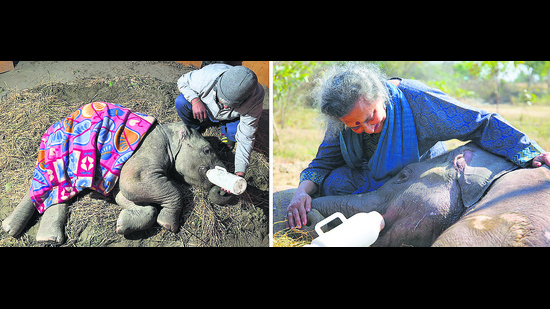Wildbuzz | O little train, what you done, Mum’s gone, I forever undone
A speeding train — with no reaction time for animal crossings factored into its passage — hit the mother and left behind in its wake a blood trail of her death smeared across the tracks. Bani was flung off the elevated tracks and into a low-lying field where forest officials found her paralysed with fear, injury and emotional trauma.
Bani is an orphaned female elephant calf, named after ‘mother earth’ by the amazing caregivers of India’s first elephant hospital run by Wildlife SOS at Mathura. She is nine months old but lies on her side in a comatose-like posture because her hind quarters took a shattering train hit. Bani and her mother were crossing a track near Jim Corbett National Park in Uttarakhand. A speeding train — with no reaction time for animal crossings factored into its passage — hit the mother and left behind in its wake a blood trail of her death smeared across the tracks. Bani was flung off the elevated tracks and into a low-lying field where forest officials found her paralysed with fear, injury and emotional trauma.

However, with the thoughtful and expeditious intervention of the chief wildlife wardens of Uttarakhand and Uttar Pradesh, the calf was sent to Mathura. Here, another of life’s miracles blessed the calf. She was placed in the hands of veterinarians and caregivers who strained every sinew of their body, mind and soul to give the calf another shot at life.
“Bani is unable to stand without support. Our objective through sustained healing is to get her onto her own legs. However, she will always remain handicapped,” Wildlife SOS veterinary officer Dr. E. Gochalan told this writer.

Bani is cleaned and massaged daily and her wounds dressed to prevent infections. Laser therapy and physiotherapy is applied to exercise her joints. Bani, as all elephants are, is intelligent, expressive and affectionate. “Bani has a 24x7 caregiver, Vijay Soren, dedicated to her plus two more working in shifts. They have won her confidence with love, care and thoughtful actions. She uses her trunk to caress their faces. But if a stranger comes into her presence, she flips the trunk in a threatening manner. Bani is put to sleep after her milk feed just like a human baby by taps on her shoulder and gentle caresses and tickles. She communicates with her caregivers via a variety of vocalisations. The caregivers then reassure her with words like,’Bani, there is nothing to worry, you shall be alright soon.’ It is the reassuring, familiar tone of their voices, which calms her, especially when she is getting treatment like laser therapy. Elephant calves while growing up in the herd communicate with all the adults to establish deep social bonds, and this is what Bani is doing with the caregivers who are now like a mother and other caring female adults of the herd to her,” Dr. Gochalan said.
Were Bani able to speak our lingo, she would have the strongest case of innocence to remonstrate against humanity’s wanton, murderous and callous ways. Are the Banis of India not even safe near the haloed Corbett park?
The Wildlife SOS released a pithy, thoughtful and empathetic perspective: “It is tempting to call this an unfortunate accident, but in reality, 186 elephants have been killed on India’s train tracks since 2009. Were Indian Railways (IR) to prevent trains from speeding through wildlife corridors or utilise AI early-warning technology, this mother would be alive and Bani wouldn’t have had to suffer life-threatening injuries. The IR must, immediately, reduce train speeds in wildlife corridors so that elephants have a chance to get out of the way. Advancements in AI early-warning technology detect and alert trains of elephants near train tracks, but these are not being widely used. The orphaned Bani is fighting for her life. We don’t know yet if she will recover, but we won’t give up on her.”
vjswild2@gmail.com






